A Comprehensive Study on Business Ethics: Codes and Practices
VerifiedAdded on 2020/04/01
|13
|3948
|384
Essay
AI Summary
This essay provides a comprehensive overview of business ethics, defining it as the moral philosophy guiding business conduct. It explores the importance of ethical codes in setting organizational values, vision, and mission, and how these codes influence the relationship between businesses and customers. The essay discusses the necessity of ethical codes for governing member conduct, establishing organizational culture, and resolving business issues such as malpractices and discrimination. It highlights the role of ethical codes in building customer trust, ensuring business survival, and fostering a positive work environment. The essay further examines different types of ethical codes, including compliance-based and value-based approaches, and emphasizes the benefits of ethical codes, such as enhanced communication, individual respect, and improved organizational metrics. Finally, it discusses twelve common ethical codes like honesty, integrity, and fairness, and their importance in business operations.

Running head: BUSINESS ETHICS
BUSINESS ETHICS
Name of the Student
Name of the University
Author note
BUSINESS ETHICS
Name of the Student
Name of the University
Author note
Paraphrase This Document
Need a fresh take? Get an instant paraphrase of this document with our AI Paraphraser
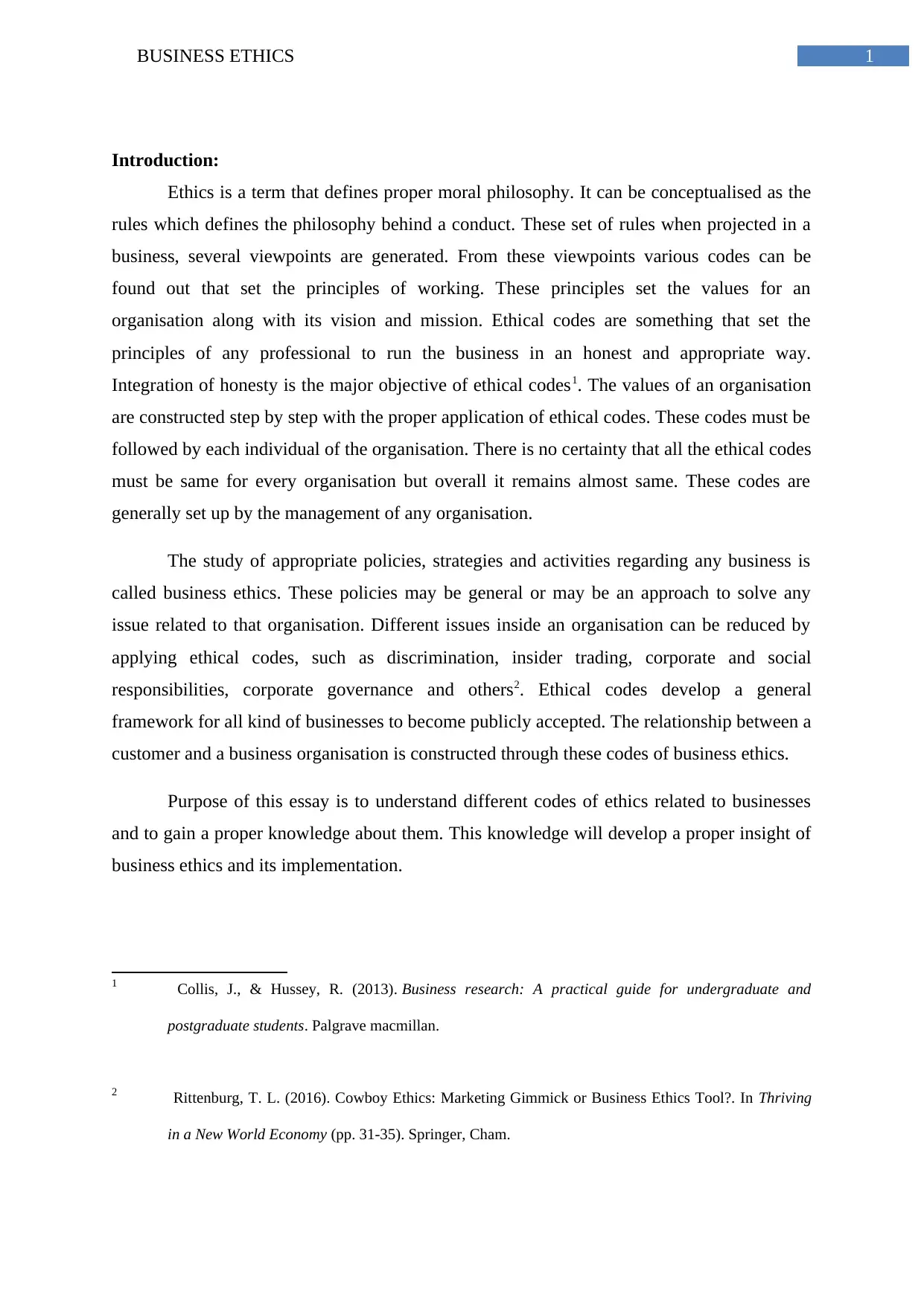
1BUSINESS ETHICS
Introduction:
Ethics is a term that defines proper moral philosophy. It can be conceptualised as the
rules which defines the philosophy behind a conduct. These set of rules when projected in a
business, several viewpoints are generated. From these viewpoints various codes can be
found out that set the principles of working. These principles set the values for an
organisation along with its vision and mission. Ethical codes are something that set the
principles of any professional to run the business in an honest and appropriate way.
Integration of honesty is the major objective of ethical codes1. The values of an organisation
are constructed step by step with the proper application of ethical codes. These codes must be
followed by each individual of the organisation. There is no certainty that all the ethical codes
must be same for every organisation but overall it remains almost same. These codes are
generally set up by the management of any organisation.
The study of appropriate policies, strategies and activities regarding any business is
called business ethics. These policies may be general or may be an approach to solve any
issue related to that organisation. Different issues inside an organisation can be reduced by
applying ethical codes, such as discrimination, insider trading, corporate and social
responsibilities, corporate governance and others2. Ethical codes develop a general
framework for all kind of businesses to become publicly accepted. The relationship between a
customer and a business organisation is constructed through these codes of business ethics.
Purpose of this essay is to understand different codes of ethics related to businesses
and to gain a proper knowledge about them. This knowledge will develop a proper insight of
business ethics and its implementation.
1 Collis, J., & Hussey, R. (2013). Business research: A practical guide for undergraduate and
postgraduate students. Palgrave macmillan.
2 Rittenburg, T. L. (2016). Cowboy Ethics: Marketing Gimmick or Business Ethics Tool?. In Thriving
in a New World Economy (pp. 31-35). Springer, Cham.
Introduction:
Ethics is a term that defines proper moral philosophy. It can be conceptualised as the
rules which defines the philosophy behind a conduct. These set of rules when projected in a
business, several viewpoints are generated. From these viewpoints various codes can be
found out that set the principles of working. These principles set the values for an
organisation along with its vision and mission. Ethical codes are something that set the
principles of any professional to run the business in an honest and appropriate way.
Integration of honesty is the major objective of ethical codes1. The values of an organisation
are constructed step by step with the proper application of ethical codes. These codes must be
followed by each individual of the organisation. There is no certainty that all the ethical codes
must be same for every organisation but overall it remains almost same. These codes are
generally set up by the management of any organisation.
The study of appropriate policies, strategies and activities regarding any business is
called business ethics. These policies may be general or may be an approach to solve any
issue related to that organisation. Different issues inside an organisation can be reduced by
applying ethical codes, such as discrimination, insider trading, corporate and social
responsibilities, corporate governance and others2. Ethical codes develop a general
framework for all kind of businesses to become publicly accepted. The relationship between a
customer and a business organisation is constructed through these codes of business ethics.
Purpose of this essay is to understand different codes of ethics related to businesses
and to gain a proper knowledge about them. This knowledge will develop a proper insight of
business ethics and its implementation.
1 Collis, J., & Hussey, R. (2013). Business research: A practical guide for undergraduate and
postgraduate students. Palgrave macmillan.
2 Rittenburg, T. L. (2016). Cowboy Ethics: Marketing Gimmick or Business Ethics Tool?. In Thriving
in a New World Economy (pp. 31-35). Springer, Cham.
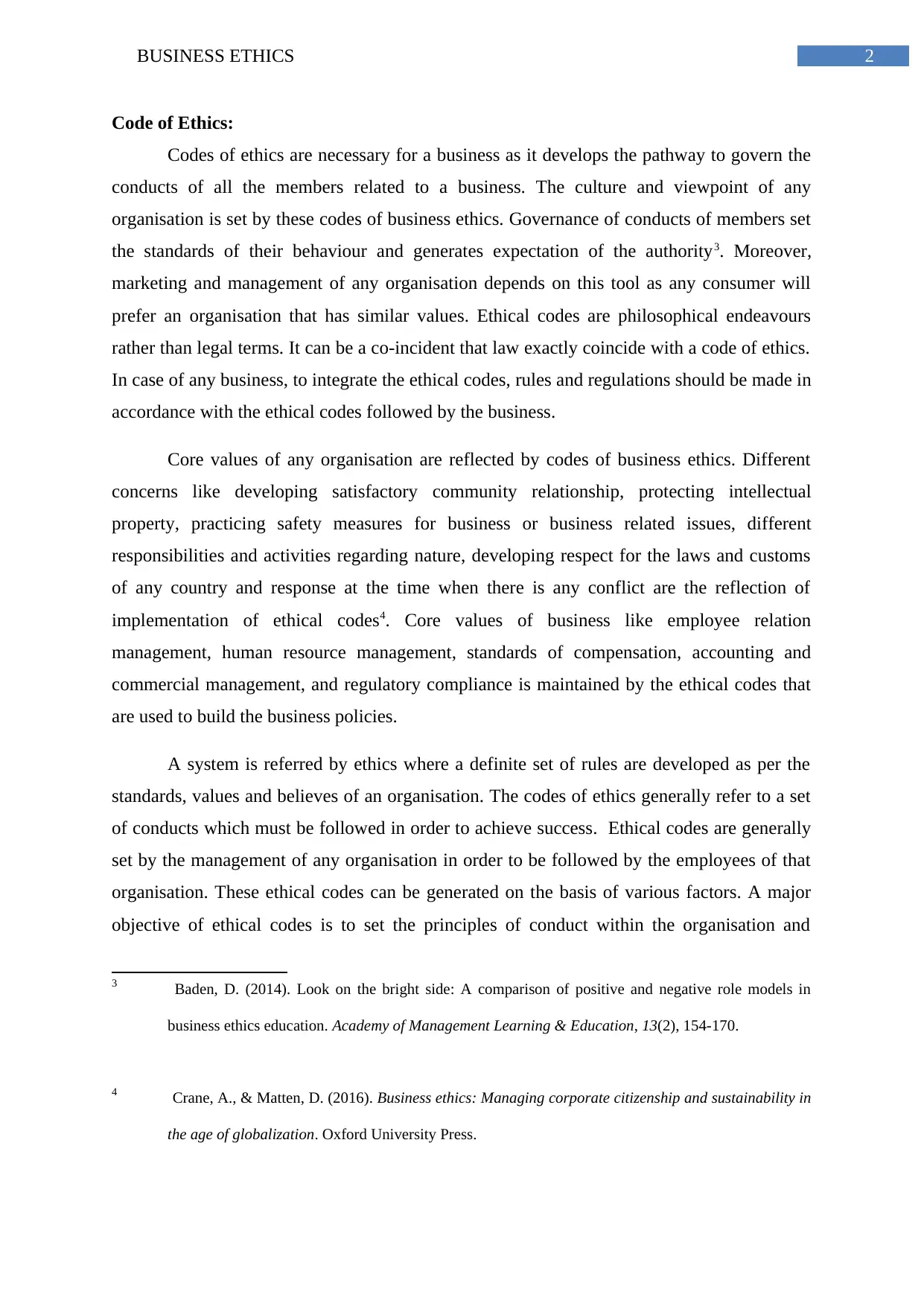
2BUSINESS ETHICS
Code of Ethics:
Codes of ethics are necessary for a business as it develops the pathway to govern the
conducts of all the members related to a business. The culture and viewpoint of any
organisation is set by these codes of business ethics. Governance of conducts of members set
the standards of their behaviour and generates expectation of the authority3. Moreover,
marketing and management of any organisation depends on this tool as any consumer will
prefer an organisation that has similar values. Ethical codes are philosophical endeavours
rather than legal terms. It can be a co-incident that law exactly coincide with a code of ethics.
In case of any business, to integrate the ethical codes, rules and regulations should be made in
accordance with the ethical codes followed by the business.
Core values of any organisation are reflected by codes of business ethics. Different
concerns like developing satisfactory community relationship, protecting intellectual
property, practicing safety measures for business or business related issues, different
responsibilities and activities regarding nature, developing respect for the laws and customs
of any country and response at the time when there is any conflict are the reflection of
implementation of ethical codes4. Core values of business like employee relation
management, human resource management, standards of compensation, accounting and
commercial management, and regulatory compliance is maintained by the ethical codes that
are used to build the business policies.
A system is referred by ethics where a definite set of rules are developed as per the
standards, values and believes of an organisation. The codes of ethics generally refer to a set
of conducts which must be followed in order to achieve success. Ethical codes are generally
set by the management of any organisation in order to be followed by the employees of that
organisation. These ethical codes can be generated on the basis of various factors. A major
objective of ethical codes is to set the principles of conduct within the organisation and
3 Baden, D. (2014). Look on the bright side: A comparison of positive and negative role models in
business ethics education. Academy of Management Learning & Education, 13(2), 154-170.
4 Crane, A., & Matten, D. (2016). Business ethics: Managing corporate citizenship and sustainability in
the age of globalization. Oxford University Press.
Code of Ethics:
Codes of ethics are necessary for a business as it develops the pathway to govern the
conducts of all the members related to a business. The culture and viewpoint of any
organisation is set by these codes of business ethics. Governance of conducts of members set
the standards of their behaviour and generates expectation of the authority3. Moreover,
marketing and management of any organisation depends on this tool as any consumer will
prefer an organisation that has similar values. Ethical codes are philosophical endeavours
rather than legal terms. It can be a co-incident that law exactly coincide with a code of ethics.
In case of any business, to integrate the ethical codes, rules and regulations should be made in
accordance with the ethical codes followed by the business.
Core values of any organisation are reflected by codes of business ethics. Different
concerns like developing satisfactory community relationship, protecting intellectual
property, practicing safety measures for business or business related issues, different
responsibilities and activities regarding nature, developing respect for the laws and customs
of any country and response at the time when there is any conflict are the reflection of
implementation of ethical codes4. Core values of business like employee relation
management, human resource management, standards of compensation, accounting and
commercial management, and regulatory compliance is maintained by the ethical codes that
are used to build the business policies.
A system is referred by ethics where a definite set of rules are developed as per the
standards, values and believes of an organisation. The codes of ethics generally refer to a set
of conducts which must be followed in order to achieve success. Ethical codes are generally
set by the management of any organisation in order to be followed by the employees of that
organisation. These ethical codes can be generated on the basis of various factors. A major
objective of ethical codes is to set the principles of conduct within the organisation and
3 Baden, D. (2014). Look on the bright side: A comparison of positive and negative role models in
business ethics education. Academy of Management Learning & Education, 13(2), 154-170.
4 Crane, A., & Matten, D. (2016). Business ethics: Managing corporate citizenship and sustainability in
the age of globalization. Oxford University Press.
⊘ This is a preview!⊘
Do you want full access?
Subscribe today to unlock all pages.

Trusted by 1+ million students worldwide
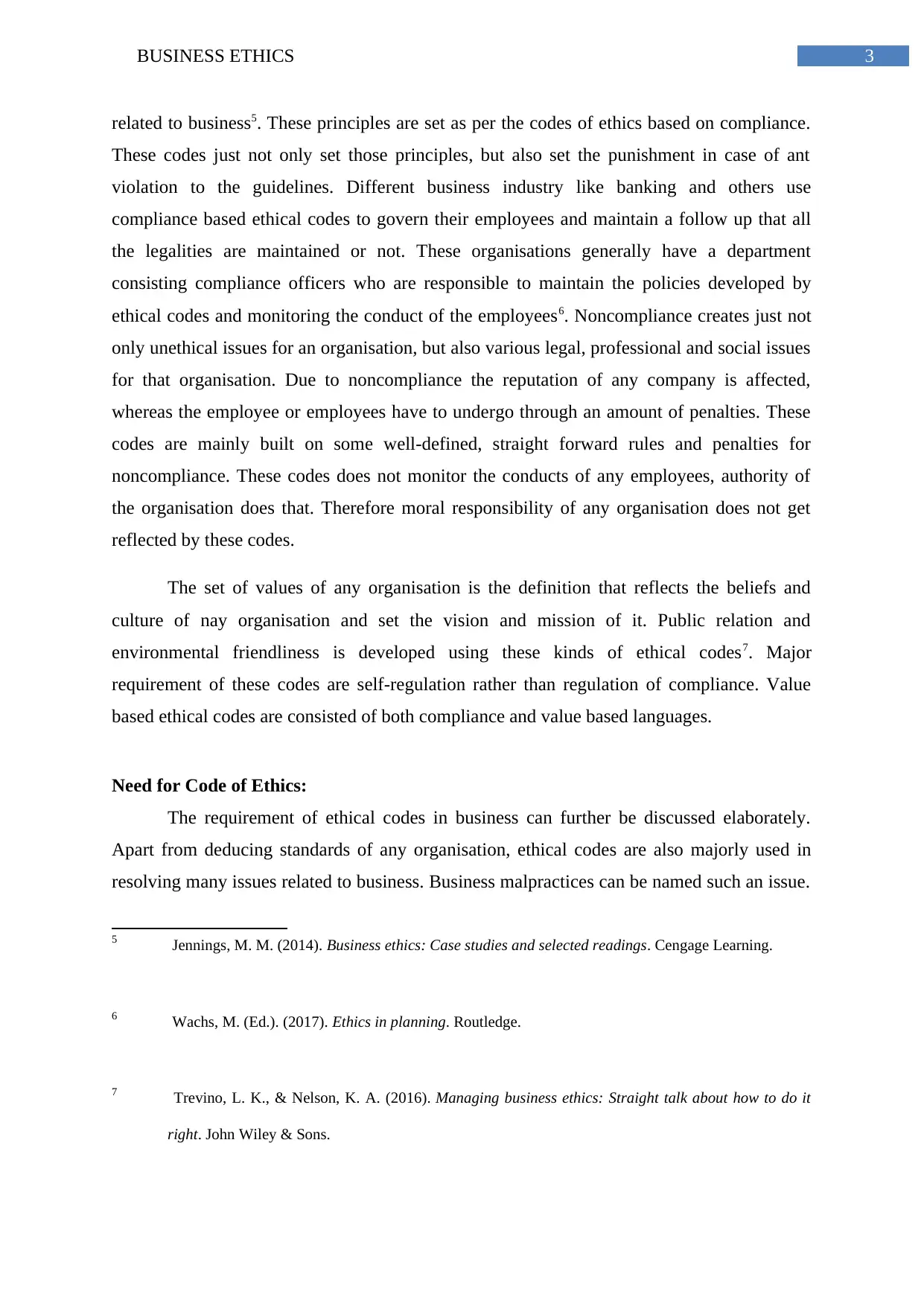
3BUSINESS ETHICS
related to business5. These principles are set as per the codes of ethics based on compliance.
These codes just not only set those principles, but also set the punishment in case of ant
violation to the guidelines. Different business industry like banking and others use
compliance based ethical codes to govern their employees and maintain a follow up that all
the legalities are maintained or not. These organisations generally have a department
consisting compliance officers who are responsible to maintain the policies developed by
ethical codes and monitoring the conduct of the employees6. Noncompliance creates just not
only unethical issues for an organisation, but also various legal, professional and social issues
for that organisation. Due to noncompliance the reputation of any company is affected,
whereas the employee or employees have to undergo through an amount of penalties. These
codes are mainly built on some well-defined, straight forward rules and penalties for
noncompliance. These codes does not monitor the conducts of any employees, authority of
the organisation does that. Therefore moral responsibility of any organisation does not get
reflected by these codes.
The set of values of any organisation is the definition that reflects the beliefs and
culture of nay organisation and set the vision and mission of it. Public relation and
environmental friendliness is developed using these kinds of ethical codes7. Major
requirement of these codes are self-regulation rather than regulation of compliance. Value
based ethical codes are consisted of both compliance and value based languages.
Need for Code of Ethics:
The requirement of ethical codes in business can further be discussed elaborately.
Apart from deducing standards of any organisation, ethical codes are also majorly used in
resolving many issues related to business. Business malpractices can be named such an issue.
5 Jennings, M. M. (2014). Business ethics: Case studies and selected readings. Cengage Learning.
6 Wachs, M. (Ed.). (2017). Ethics in planning. Routledge.
7 Trevino, L. K., & Nelson, K. A. (2016). Managing business ethics: Straight talk about how to do it
right. John Wiley & Sons.
related to business5. These principles are set as per the codes of ethics based on compliance.
These codes just not only set those principles, but also set the punishment in case of ant
violation to the guidelines. Different business industry like banking and others use
compliance based ethical codes to govern their employees and maintain a follow up that all
the legalities are maintained or not. These organisations generally have a department
consisting compliance officers who are responsible to maintain the policies developed by
ethical codes and monitoring the conduct of the employees6. Noncompliance creates just not
only unethical issues for an organisation, but also various legal, professional and social issues
for that organisation. Due to noncompliance the reputation of any company is affected,
whereas the employee or employees have to undergo through an amount of penalties. These
codes are mainly built on some well-defined, straight forward rules and penalties for
noncompliance. These codes does not monitor the conducts of any employees, authority of
the organisation does that. Therefore moral responsibility of any organisation does not get
reflected by these codes.
The set of values of any organisation is the definition that reflects the beliefs and
culture of nay organisation and set the vision and mission of it. Public relation and
environmental friendliness is developed using these kinds of ethical codes7. Major
requirement of these codes are self-regulation rather than regulation of compliance. Value
based ethical codes are consisted of both compliance and value based languages.
Need for Code of Ethics:
The requirement of ethical codes in business can further be discussed elaborately.
Apart from deducing standards of any organisation, ethical codes are also majorly used in
resolving many issues related to business. Business malpractices can be named such an issue.
5 Jennings, M. M. (2014). Business ethics: Case studies and selected readings. Cengage Learning.
6 Wachs, M. (Ed.). (2017). Ethics in planning. Routledge.
7 Trevino, L. K., & Nelson, K. A. (2016). Managing business ethics: Straight talk about how to do it
right. John Wiley & Sons.
Paraphrase This Document
Need a fresh take? Get an instant paraphrase of this document with our AI Paraphraser
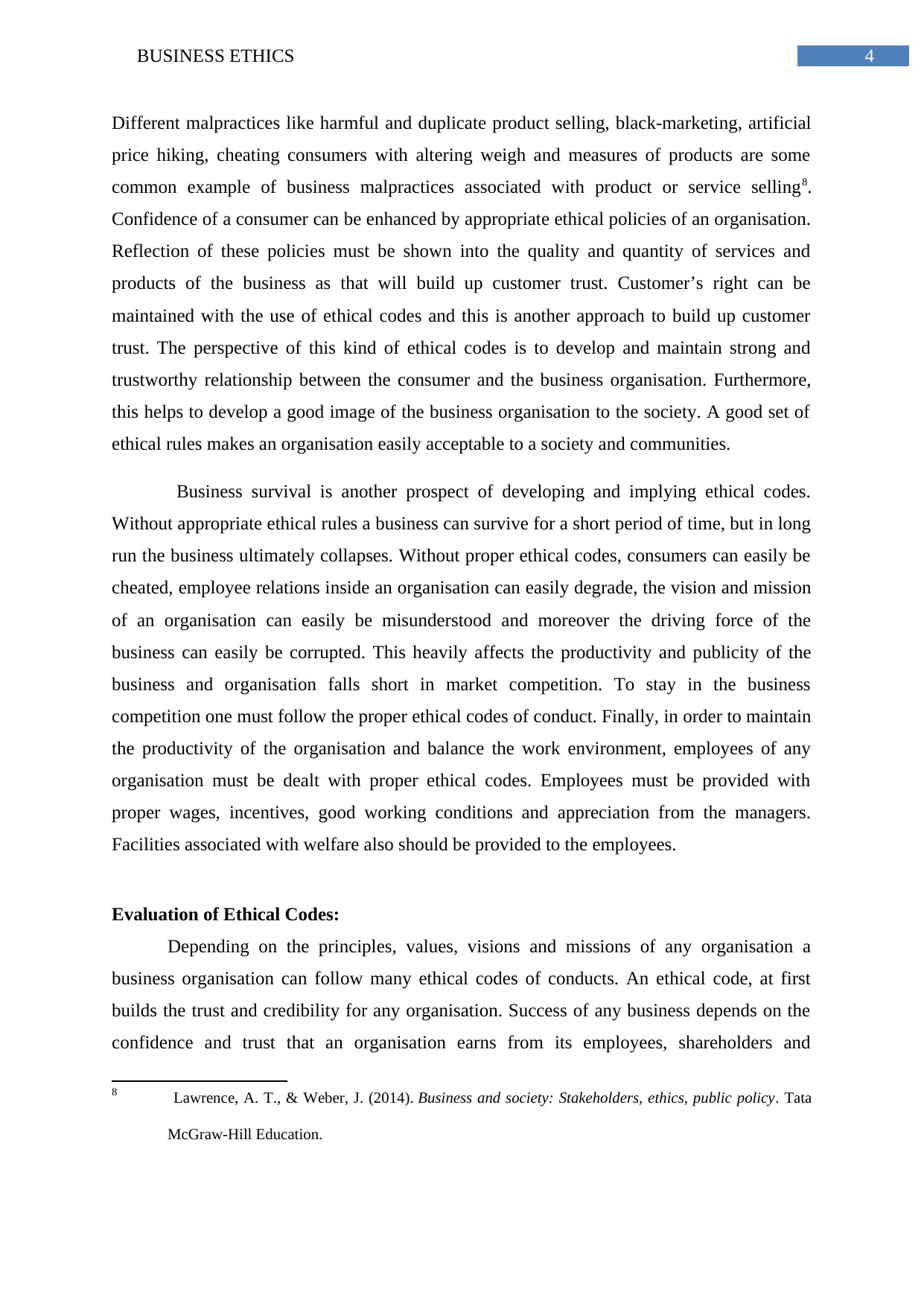
4BUSINESS ETHICS
Different malpractices like harmful and duplicate product selling, black-marketing, artificial
price hiking, cheating consumers with altering weigh and measures of products are some
common example of business malpractices associated with product or service selling8.
Confidence of a consumer can be enhanced by appropriate ethical policies of an organisation.
Reflection of these policies must be shown into the quality and quantity of services and
products of the business as that will build up customer trust. Customer’s right can be
maintained with the use of ethical codes and this is another approach to build up customer
trust. The perspective of this kind of ethical codes is to develop and maintain strong and
trustworthy relationship between the consumer and the business organisation. Furthermore,
this helps to develop a good image of the business organisation to the society. A good set of
ethical rules makes an organisation easily acceptable to a society and communities.
Business survival is another prospect of developing and implying ethical codes.
Without appropriate ethical rules a business can survive for a short period of time, but in long
run the business ultimately collapses. Without proper ethical codes, consumers can easily be
cheated, employee relations inside an organisation can easily degrade, the vision and mission
of an organisation can easily be misunderstood and moreover the driving force of the
business can easily be corrupted. This heavily affects the productivity and publicity of the
business and organisation falls short in market competition. To stay in the business
competition one must follow the proper ethical codes of conduct. Finally, in order to maintain
the productivity of the organisation and balance the work environment, employees of any
organisation must be dealt with proper ethical codes. Employees must be provided with
proper wages, incentives, good working conditions and appreciation from the managers.
Facilities associated with welfare also should be provided to the employees.
Evaluation of Ethical Codes:
Depending on the principles, values, visions and missions of any organisation a
business organisation can follow many ethical codes of conducts. An ethical code, at first
builds the trust and credibility for any organisation. Success of any business depends on the
confidence and trust that an organisation earns from its employees, shareholders and
8 Lawrence, A. T., & Weber, J. (2014). Business and society: Stakeholders, ethics, public policy. Tata
McGraw-Hill Education.
Different malpractices like harmful and duplicate product selling, black-marketing, artificial
price hiking, cheating consumers with altering weigh and measures of products are some
common example of business malpractices associated with product or service selling8.
Confidence of a consumer can be enhanced by appropriate ethical policies of an organisation.
Reflection of these policies must be shown into the quality and quantity of services and
products of the business as that will build up customer trust. Customer’s right can be
maintained with the use of ethical codes and this is another approach to build up customer
trust. The perspective of this kind of ethical codes is to develop and maintain strong and
trustworthy relationship between the consumer and the business organisation. Furthermore,
this helps to develop a good image of the business organisation to the society. A good set of
ethical rules makes an organisation easily acceptable to a society and communities.
Business survival is another prospect of developing and implying ethical codes.
Without appropriate ethical rules a business can survive for a short period of time, but in long
run the business ultimately collapses. Without proper ethical codes, consumers can easily be
cheated, employee relations inside an organisation can easily degrade, the vision and mission
of an organisation can easily be misunderstood and moreover the driving force of the
business can easily be corrupted. This heavily affects the productivity and publicity of the
business and organisation falls short in market competition. To stay in the business
competition one must follow the proper ethical codes of conduct. Finally, in order to maintain
the productivity of the organisation and balance the work environment, employees of any
organisation must be dealt with proper ethical codes. Employees must be provided with
proper wages, incentives, good working conditions and appreciation from the managers.
Facilities associated with welfare also should be provided to the employees.
Evaluation of Ethical Codes:
Depending on the principles, values, visions and missions of any organisation a
business organisation can follow many ethical codes of conducts. An ethical code, at first
builds the trust and credibility for any organisation. Success of any business depends on the
confidence and trust that an organisation earns from its employees, shareholders and
8 Lawrence, A. T., & Weber, J. (2014). Business and society: Stakeholders, ethics, public policy. Tata
McGraw-Hill Education.
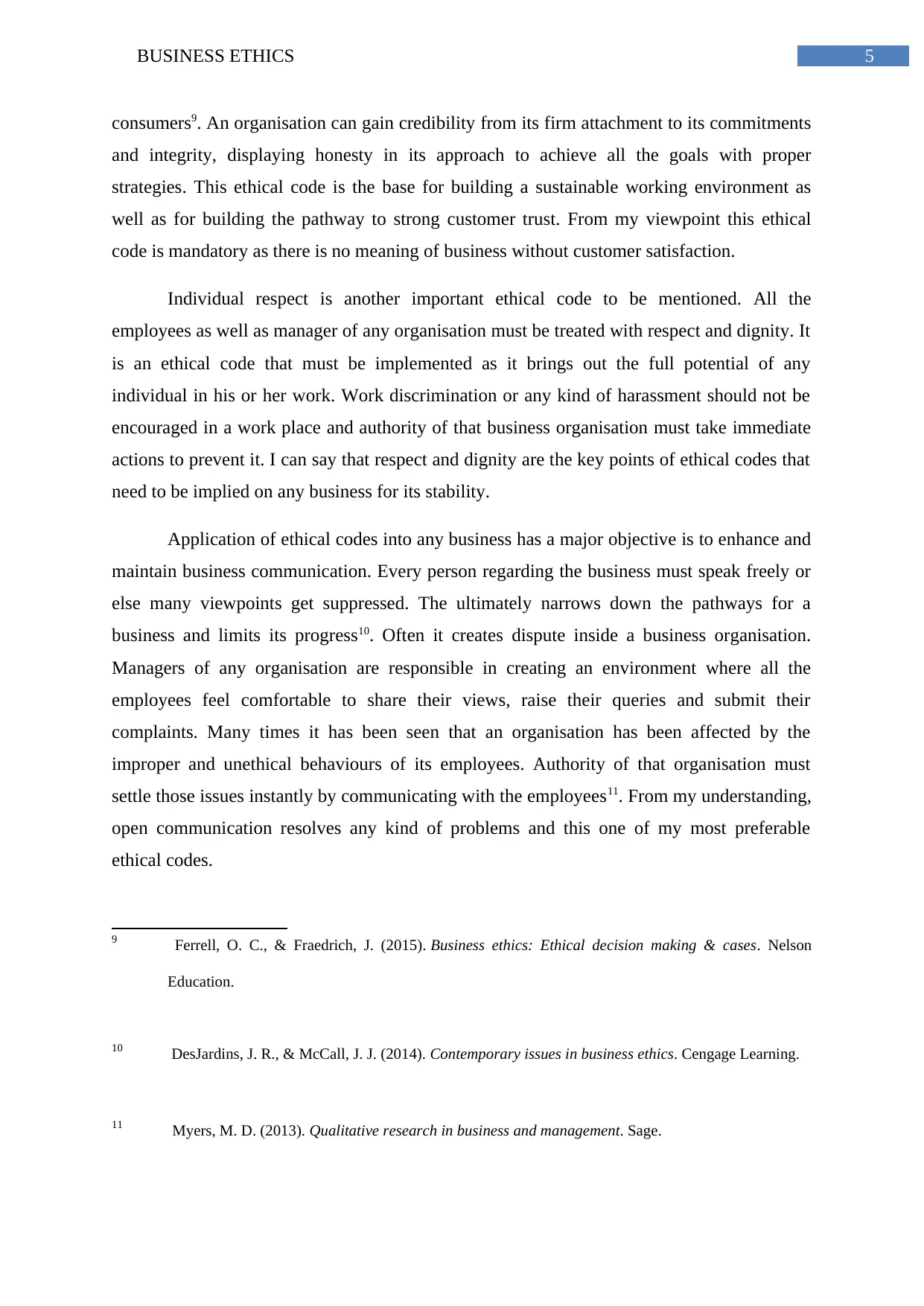
5BUSINESS ETHICS
consumers9. An organisation can gain credibility from its firm attachment to its commitments
and integrity, displaying honesty in its approach to achieve all the goals with proper
strategies. This ethical code is the base for building a sustainable working environment as
well as for building the pathway to strong customer trust. From my viewpoint this ethical
code is mandatory as there is no meaning of business without customer satisfaction.
Individual respect is another important ethical code to be mentioned. All the
employees as well as manager of any organisation must be treated with respect and dignity. It
is an ethical code that must be implemented as it brings out the full potential of any
individual in his or her work. Work discrimination or any kind of harassment should not be
encouraged in a work place and authority of that business organisation must take immediate
actions to prevent it. I can say that respect and dignity are the key points of ethical codes that
need to be implied on any business for its stability.
Application of ethical codes into any business has a major objective is to enhance and
maintain business communication. Every person regarding the business must speak freely or
else many viewpoints get suppressed. The ultimately narrows down the pathways for a
business and limits its progress10. Often it creates dispute inside a business organisation.
Managers of any organisation are responsible in creating an environment where all the
employees feel comfortable to share their views, raise their queries and submit their
complaints. Many times it has been seen that an organisation has been affected by the
improper and unethical behaviours of its employees. Authority of that organisation must
settle those issues instantly by communicating with the employees11. From my understanding,
open communication resolves any kind of problems and this one of my most preferable
ethical codes.
9 Ferrell, O. C., & Fraedrich, J. (2015). Business ethics: Ethical decision making & cases. Nelson
Education.
10 DesJardins, J. R., & McCall, J. J. (2014). Contemporary issues in business ethics. Cengage Learning.
11 Myers, M. D. (2013). Qualitative research in business and management. Sage.
consumers9. An organisation can gain credibility from its firm attachment to its commitments
and integrity, displaying honesty in its approach to achieve all the goals with proper
strategies. This ethical code is the base for building a sustainable working environment as
well as for building the pathway to strong customer trust. From my viewpoint this ethical
code is mandatory as there is no meaning of business without customer satisfaction.
Individual respect is another important ethical code to be mentioned. All the
employees as well as manager of any organisation must be treated with respect and dignity. It
is an ethical code that must be implemented as it brings out the full potential of any
individual in his or her work. Work discrimination or any kind of harassment should not be
encouraged in a work place and authority of that business organisation must take immediate
actions to prevent it. I can say that respect and dignity are the key points of ethical codes that
need to be implied on any business for its stability.
Application of ethical codes into any business has a major objective is to enhance and
maintain business communication. Every person regarding the business must speak freely or
else many viewpoints get suppressed. The ultimately narrows down the pathways for a
business and limits its progress10. Often it creates dispute inside a business organisation.
Managers of any organisation are responsible in creating an environment where all the
employees feel comfortable to share their views, raise their queries and submit their
complaints. Many times it has been seen that an organisation has been affected by the
improper and unethical behaviours of its employees. Authority of that organisation must
settle those issues instantly by communicating with the employees11. From my understanding,
open communication resolves any kind of problems and this one of my most preferable
ethical codes.
9 Ferrell, O. C., & Fraedrich, J. (2015). Business ethics: Ethical decision making & cases. Nelson
Education.
10 DesJardins, J. R., & McCall, J. J. (2014). Contemporary issues in business ethics. Cengage Learning.
11 Myers, M. D. (2013). Qualitative research in business and management. Sage.
⊘ This is a preview!⊘
Do you want full access?
Subscribe today to unlock all pages.

Trusted by 1+ million students worldwide
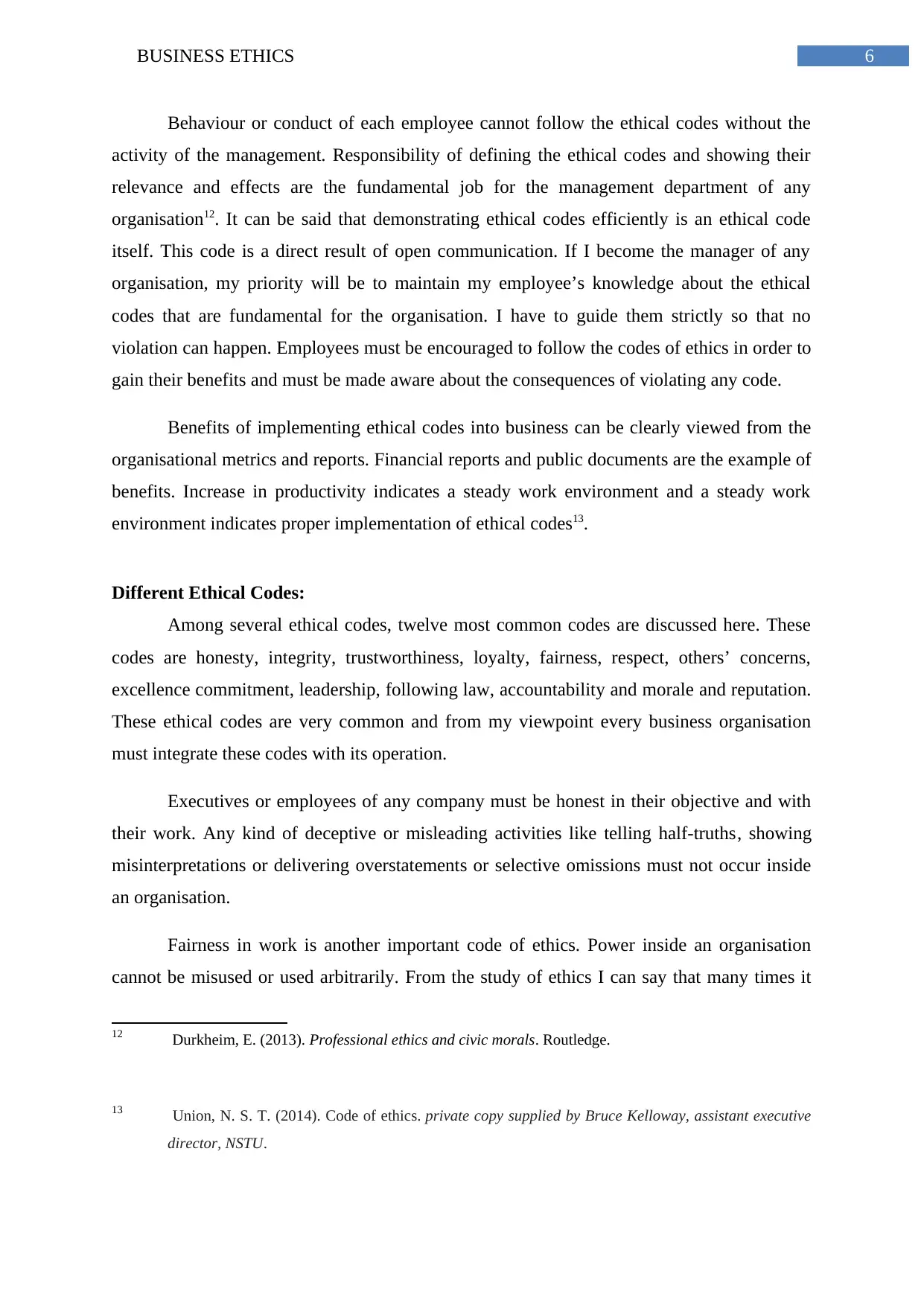
6BUSINESS ETHICS
Behaviour or conduct of each employee cannot follow the ethical codes without the
activity of the management. Responsibility of defining the ethical codes and showing their
relevance and effects are the fundamental job for the management department of any
organisation12. It can be said that demonstrating ethical codes efficiently is an ethical code
itself. This code is a direct result of open communication. If I become the manager of any
organisation, my priority will be to maintain my employee’s knowledge about the ethical
codes that are fundamental for the organisation. I have to guide them strictly so that no
violation can happen. Employees must be encouraged to follow the codes of ethics in order to
gain their benefits and must be made aware about the consequences of violating any code.
Benefits of implementing ethical codes into business can be clearly viewed from the
organisational metrics and reports. Financial reports and public documents are the example of
benefits. Increase in productivity indicates a steady work environment and a steady work
environment indicates proper implementation of ethical codes13.
Different Ethical Codes:
Among several ethical codes, twelve most common codes are discussed here. These
codes are honesty, integrity, trustworthiness, loyalty, fairness, respect, others’ concerns,
excellence commitment, leadership, following law, accountability and morale and reputation.
These ethical codes are very common and from my viewpoint every business organisation
must integrate these codes with its operation.
Executives or employees of any company must be honest in their objective and with
their work. Any kind of deceptive or misleading activities like telling half-truths, showing
misinterpretations or delivering overstatements or selective omissions must not occur inside
an organisation.
Fairness in work is another important code of ethics. Power inside an organisation
cannot be misused or used arbitrarily. From the study of ethics I can say that many times it
12 Durkheim, E. (2013). Professional ethics and civic morals. Routledge.
13 Union, N. S. T. (2014). Code of ethics. private copy supplied by Bruce Kelloway, assistant executive
director, NSTU.
Behaviour or conduct of each employee cannot follow the ethical codes without the
activity of the management. Responsibility of defining the ethical codes and showing their
relevance and effects are the fundamental job for the management department of any
organisation12. It can be said that demonstrating ethical codes efficiently is an ethical code
itself. This code is a direct result of open communication. If I become the manager of any
organisation, my priority will be to maintain my employee’s knowledge about the ethical
codes that are fundamental for the organisation. I have to guide them strictly so that no
violation can happen. Employees must be encouraged to follow the codes of ethics in order to
gain their benefits and must be made aware about the consequences of violating any code.
Benefits of implementing ethical codes into business can be clearly viewed from the
organisational metrics and reports. Financial reports and public documents are the example of
benefits. Increase in productivity indicates a steady work environment and a steady work
environment indicates proper implementation of ethical codes13.
Different Ethical Codes:
Among several ethical codes, twelve most common codes are discussed here. These
codes are honesty, integrity, trustworthiness, loyalty, fairness, respect, others’ concerns,
excellence commitment, leadership, following law, accountability and morale and reputation.
These ethical codes are very common and from my viewpoint every business organisation
must integrate these codes with its operation.
Executives or employees of any company must be honest in their objective and with
their work. Any kind of deceptive or misleading activities like telling half-truths, showing
misinterpretations or delivering overstatements or selective omissions must not occur inside
an organisation.
Fairness in work is another important code of ethics. Power inside an organisation
cannot be misused or used arbitrarily. From the study of ethics I can say that many times it
12 Durkheim, E. (2013). Professional ethics and civic morals. Routledge.
13 Union, N. S. T. (2014). Code of ethics. private copy supplied by Bruce Kelloway, assistant executive
director, NSTU.
Paraphrase This Document
Need a fresh take? Get an instant paraphrase of this document with our AI Paraphraser
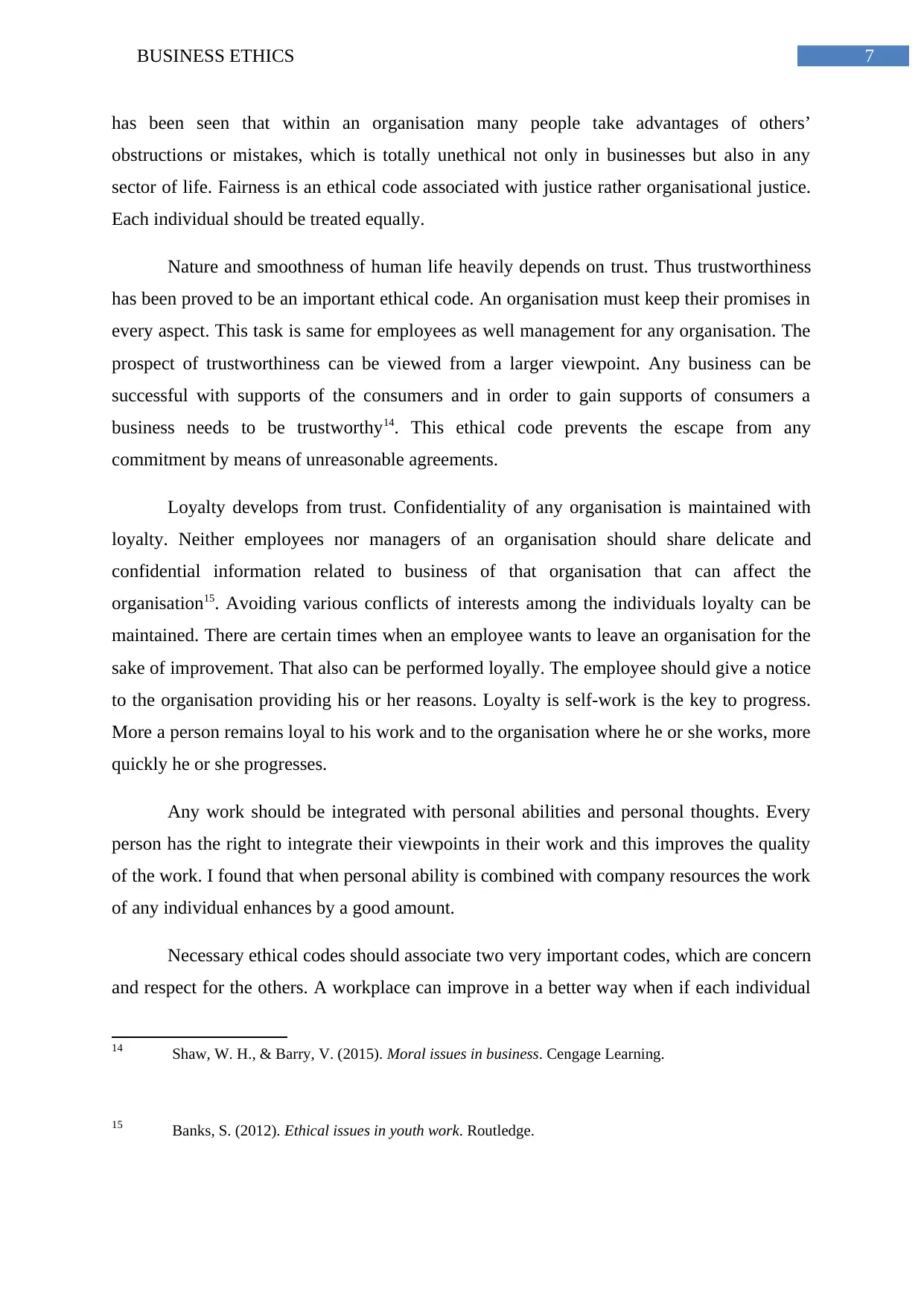
7BUSINESS ETHICS
has been seen that within an organisation many people take advantages of others’
obstructions or mistakes, which is totally unethical not only in businesses but also in any
sector of life. Fairness is an ethical code associated with justice rather organisational justice.
Each individual should be treated equally.
Nature and smoothness of human life heavily depends on trust. Thus trustworthiness
has been proved to be an important ethical code. An organisation must keep their promises in
every aspect. This task is same for employees as well management for any organisation. The
prospect of trustworthiness can be viewed from a larger viewpoint. Any business can be
successful with supports of the consumers and in order to gain supports of consumers a
business needs to be trustworthy14. This ethical code prevents the escape from any
commitment by means of unreasonable agreements.
Loyalty develops from trust. Confidentiality of any organisation is maintained with
loyalty. Neither employees nor managers of an organisation should share delicate and
confidential information related to business of that organisation that can affect the
organisation15. Avoiding various conflicts of interests among the individuals loyalty can be
maintained. There are certain times when an employee wants to leave an organisation for the
sake of improvement. That also can be performed loyally. The employee should give a notice
to the organisation providing his or her reasons. Loyalty is self-work is the key to progress.
More a person remains loyal to his work and to the organisation where he or she works, more
quickly he or she progresses.
Any work should be integrated with personal abilities and personal thoughts. Every
person has the right to integrate their viewpoints in their work and this improves the quality
of the work. I found that when personal ability is combined with company resources the work
of any individual enhances by a good amount.
Necessary ethical codes should associate two very important codes, which are concern
and respect for the others. A workplace can improve in a better way when if each individual
14 Shaw, W. H., & Barry, V. (2015). Moral issues in business. Cengage Learning.
15 Banks, S. (2012). Ethical issues in youth work. Routledge.
has been seen that within an organisation many people take advantages of others’
obstructions or mistakes, which is totally unethical not only in businesses but also in any
sector of life. Fairness is an ethical code associated with justice rather organisational justice.
Each individual should be treated equally.
Nature and smoothness of human life heavily depends on trust. Thus trustworthiness
has been proved to be an important ethical code. An organisation must keep their promises in
every aspect. This task is same for employees as well management for any organisation. The
prospect of trustworthiness can be viewed from a larger viewpoint. Any business can be
successful with supports of the consumers and in order to gain supports of consumers a
business needs to be trustworthy14. This ethical code prevents the escape from any
commitment by means of unreasonable agreements.
Loyalty develops from trust. Confidentiality of any organisation is maintained with
loyalty. Neither employees nor managers of an organisation should share delicate and
confidential information related to business of that organisation that can affect the
organisation15. Avoiding various conflicts of interests among the individuals loyalty can be
maintained. There are certain times when an employee wants to leave an organisation for the
sake of improvement. That also can be performed loyally. The employee should give a notice
to the organisation providing his or her reasons. Loyalty is self-work is the key to progress.
More a person remains loyal to his work and to the organisation where he or she works, more
quickly he or she progresses.
Any work should be integrated with personal abilities and personal thoughts. Every
person has the right to integrate their viewpoints in their work and this improves the quality
of the work. I found that when personal ability is combined with company resources the work
of any individual enhances by a good amount.
Necessary ethical codes should associate two very important codes, which are concern
and respect for the others. A workplace can improve in a better way when if each individual
14 Shaw, W. H., & Barry, V. (2015). Moral issues in business. Cengage Learning.
15 Banks, S. (2012). Ethical issues in youth work. Routledge.
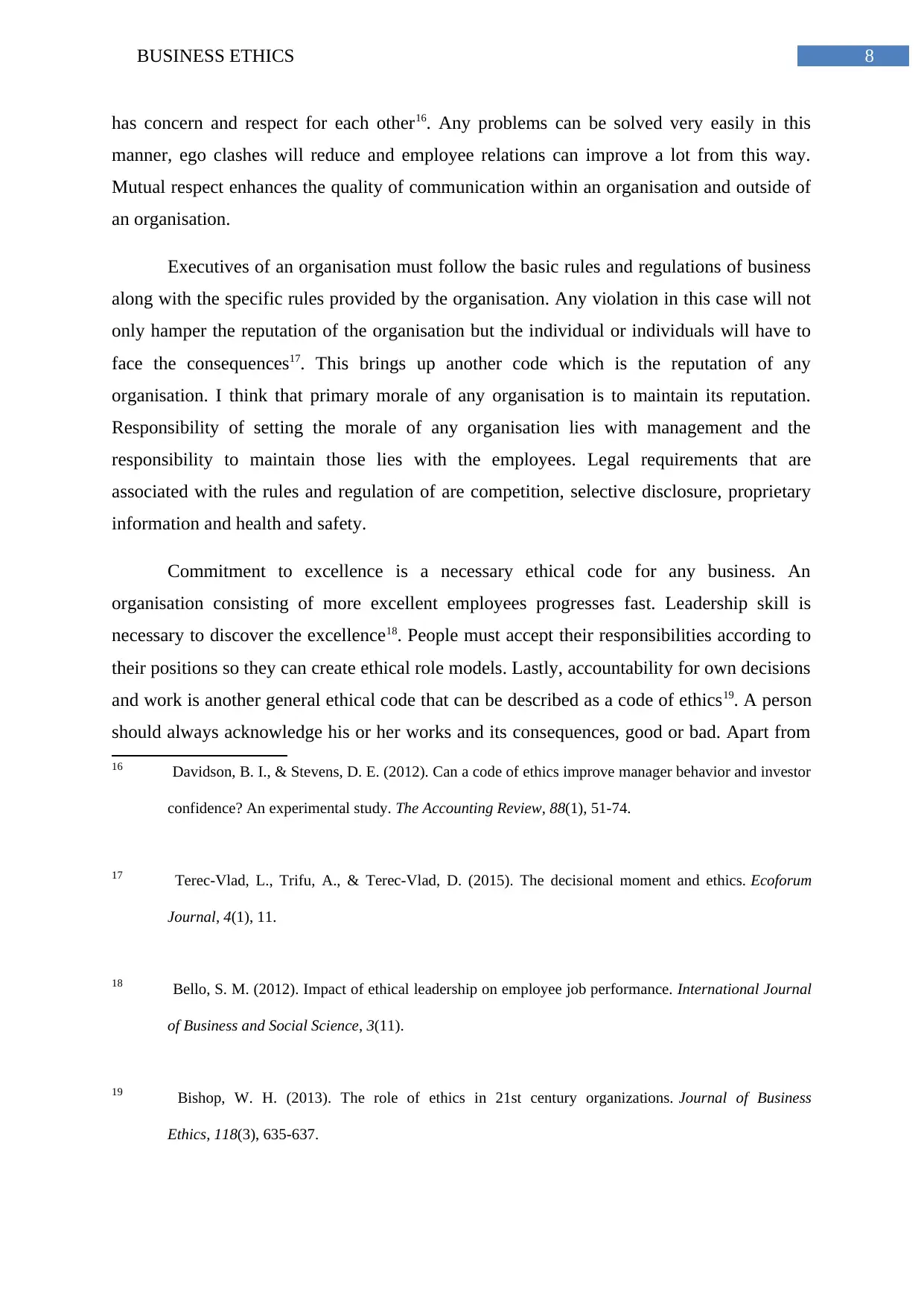
8BUSINESS ETHICS
has concern and respect for each other16. Any problems can be solved very easily in this
manner, ego clashes will reduce and employee relations can improve a lot from this way.
Mutual respect enhances the quality of communication within an organisation and outside of
an organisation.
Executives of an organisation must follow the basic rules and regulations of business
along with the specific rules provided by the organisation. Any violation in this case will not
only hamper the reputation of the organisation but the individual or individuals will have to
face the consequences17. This brings up another code which is the reputation of any
organisation. I think that primary morale of any organisation is to maintain its reputation.
Responsibility of setting the morale of any organisation lies with management and the
responsibility to maintain those lies with the employees. Legal requirements that are
associated with the rules and regulation of are competition, selective disclosure, proprietary
information and health and safety.
Commitment to excellence is a necessary ethical code for any business. An
organisation consisting of more excellent employees progresses fast. Leadership skill is
necessary to discover the excellence18. People must accept their responsibilities according to
their positions so they can create ethical role models. Lastly, accountability for own decisions
and work is another general ethical code that can be described as a code of ethics19. A person
should always acknowledge his or her works and its consequences, good or bad. Apart from
16 Davidson, B. I., & Stevens, D. E. (2012). Can a code of ethics improve manager behavior and investor
confidence? An experimental study. The Accounting Review, 88(1), 51-74.
17 Terec-Vlad, L., Trifu, A., & Terec-Vlad, D. (2015). The decisional moment and ethics. Ecoforum
Journal, 4(1), 11.
18 Bello, S. M. (2012). Impact of ethical leadership on employee job performance. International Journal
of Business and Social Science, 3(11).
19 Bishop, W. H. (2013). The role of ethics in 21st century organizations. Journal of Business
Ethics, 118(3), 635-637.
has concern and respect for each other16. Any problems can be solved very easily in this
manner, ego clashes will reduce and employee relations can improve a lot from this way.
Mutual respect enhances the quality of communication within an organisation and outside of
an organisation.
Executives of an organisation must follow the basic rules and regulations of business
along with the specific rules provided by the organisation. Any violation in this case will not
only hamper the reputation of the organisation but the individual or individuals will have to
face the consequences17. This brings up another code which is the reputation of any
organisation. I think that primary morale of any organisation is to maintain its reputation.
Responsibility of setting the morale of any organisation lies with management and the
responsibility to maintain those lies with the employees. Legal requirements that are
associated with the rules and regulation of are competition, selective disclosure, proprietary
information and health and safety.
Commitment to excellence is a necessary ethical code for any business. An
organisation consisting of more excellent employees progresses fast. Leadership skill is
necessary to discover the excellence18. People must accept their responsibilities according to
their positions so they can create ethical role models. Lastly, accountability for own decisions
and work is another general ethical code that can be described as a code of ethics19. A person
should always acknowledge his or her works and its consequences, good or bad. Apart from
16 Davidson, B. I., & Stevens, D. E. (2012). Can a code of ethics improve manager behavior and investor
confidence? An experimental study. The Accounting Review, 88(1), 51-74.
17 Terec-Vlad, L., Trifu, A., & Terec-Vlad, D. (2015). The decisional moment and ethics. Ecoforum
Journal, 4(1), 11.
18 Bello, S. M. (2012). Impact of ethical leadership on employee job performance. International Journal
of Business and Social Science, 3(11).
19 Bishop, W. H. (2013). The role of ethics in 21st century organizations. Journal of Business
Ethics, 118(3), 635-637.
⊘ This is a preview!⊘
Do you want full access?
Subscribe today to unlock all pages.

Trusted by 1+ million students worldwide
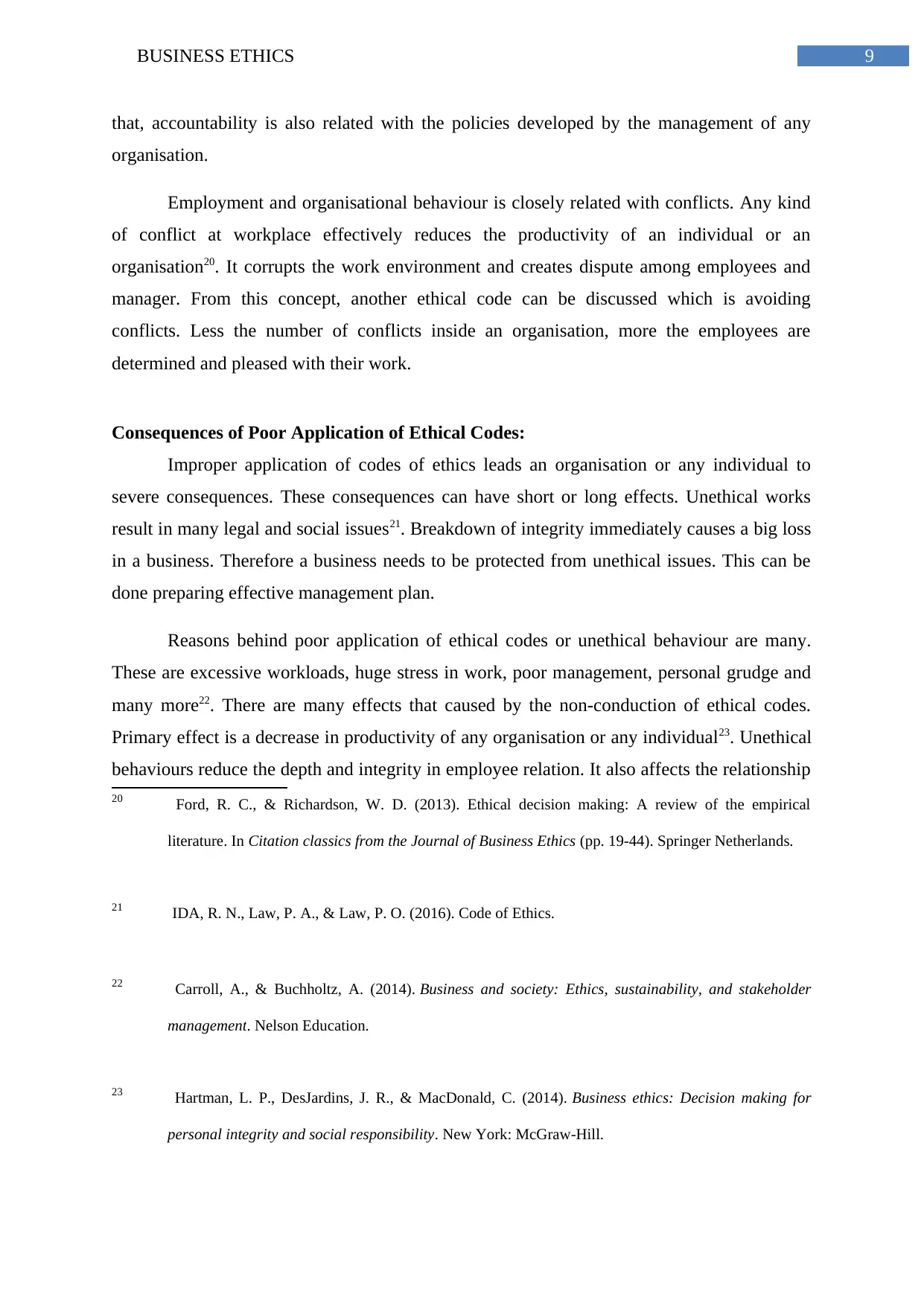
9BUSINESS ETHICS
that, accountability is also related with the policies developed by the management of any
organisation.
Employment and organisational behaviour is closely related with conflicts. Any kind
of conflict at workplace effectively reduces the productivity of an individual or an
organisation20. It corrupts the work environment and creates dispute among employees and
manager. From this concept, another ethical code can be discussed which is avoiding
conflicts. Less the number of conflicts inside an organisation, more the employees are
determined and pleased with their work.
Consequences of Poor Application of Ethical Codes:
Improper application of codes of ethics leads an organisation or any individual to
severe consequences. These consequences can have short or long effects. Unethical works
result in many legal and social issues21. Breakdown of integrity immediately causes a big loss
in a business. Therefore a business needs to be protected from unethical issues. This can be
done preparing effective management plan.
Reasons behind poor application of ethical codes or unethical behaviour are many.
These are excessive workloads, huge stress in work, poor management, personal grudge and
many more22. There are many effects that caused by the non-conduction of ethical codes.
Primary effect is a decrease in productivity of any organisation or any individual23. Unethical
behaviours reduce the depth and integrity in employee relation. It also affects the relationship
20 Ford, R. C., & Richardson, W. D. (2013). Ethical decision making: A review of the empirical
literature. In Citation classics from the Journal of Business Ethics (pp. 19-44). Springer Netherlands.
21 IDA, R. N., Law, P. A., & Law, P. O. (2016). Code of Ethics.
22 Carroll, A., & Buchholtz, A. (2014). Business and society: Ethics, sustainability, and stakeholder
management. Nelson Education.
23 Hartman, L. P., DesJardins, J. R., & MacDonald, C. (2014). Business ethics: Decision making for
personal integrity and social responsibility. New York: McGraw-Hill.
that, accountability is also related with the policies developed by the management of any
organisation.
Employment and organisational behaviour is closely related with conflicts. Any kind
of conflict at workplace effectively reduces the productivity of an individual or an
organisation20. It corrupts the work environment and creates dispute among employees and
manager. From this concept, another ethical code can be discussed which is avoiding
conflicts. Less the number of conflicts inside an organisation, more the employees are
determined and pleased with their work.
Consequences of Poor Application of Ethical Codes:
Improper application of codes of ethics leads an organisation or any individual to
severe consequences. These consequences can have short or long effects. Unethical works
result in many legal and social issues21. Breakdown of integrity immediately causes a big loss
in a business. Therefore a business needs to be protected from unethical issues. This can be
done preparing effective management plan.
Reasons behind poor application of ethical codes or unethical behaviour are many.
These are excessive workloads, huge stress in work, poor management, personal grudge and
many more22. There are many effects that caused by the non-conduction of ethical codes.
Primary effect is a decrease in productivity of any organisation or any individual23. Unethical
behaviours reduce the depth and integrity in employee relation. It also affects the relationship
20 Ford, R. C., & Richardson, W. D. (2013). Ethical decision making: A review of the empirical
literature. In Citation classics from the Journal of Business Ethics (pp. 19-44). Springer Netherlands.
21 IDA, R. N., Law, P. A., & Law, P. O. (2016). Code of Ethics.
22 Carroll, A., & Buchholtz, A. (2014). Business and society: Ethics, sustainability, and stakeholder
management. Nelson Education.
23 Hartman, L. P., DesJardins, J. R., & MacDonald, C. (2014). Business ethics: Decision making for
personal integrity and social responsibility. New York: McGraw-Hill.
Paraphrase This Document
Need a fresh take? Get an instant paraphrase of this document with our AI Paraphraser
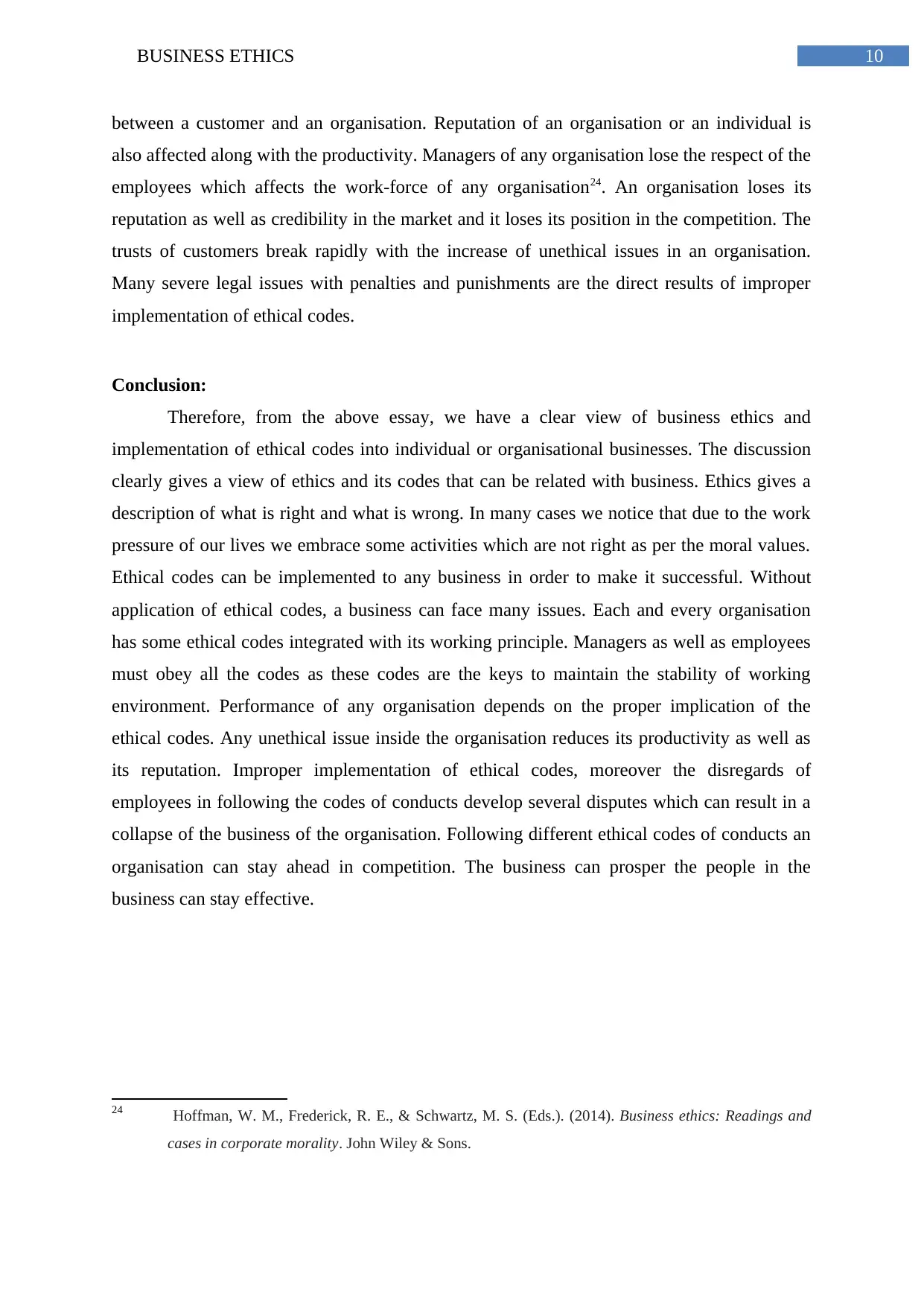
10BUSINESS ETHICS
between a customer and an organisation. Reputation of an organisation or an individual is
also affected along with the productivity. Managers of any organisation lose the respect of the
employees which affects the work-force of any organisation24. An organisation loses its
reputation as well as credibility in the market and it loses its position in the competition. The
trusts of customers break rapidly with the increase of unethical issues in an organisation.
Many severe legal issues with penalties and punishments are the direct results of improper
implementation of ethical codes.
Conclusion:
Therefore, from the above essay, we have a clear view of business ethics and
implementation of ethical codes into individual or organisational businesses. The discussion
clearly gives a view of ethics and its codes that can be related with business. Ethics gives a
description of what is right and what is wrong. In many cases we notice that due to the work
pressure of our lives we embrace some activities which are not right as per the moral values.
Ethical codes can be implemented to any business in order to make it successful. Without
application of ethical codes, a business can face many issues. Each and every organisation
has some ethical codes integrated with its working principle. Managers as well as employees
must obey all the codes as these codes are the keys to maintain the stability of working
environment. Performance of any organisation depends on the proper implication of the
ethical codes. Any unethical issue inside the organisation reduces its productivity as well as
its reputation. Improper implementation of ethical codes, moreover the disregards of
employees in following the codes of conducts develop several disputes which can result in a
collapse of the business of the organisation. Following different ethical codes of conducts an
organisation can stay ahead in competition. The business can prosper the people in the
business can stay effective.
24 Hoffman, W. M., Frederick, R. E., & Schwartz, M. S. (Eds.). (2014). Business ethics: Readings and
cases in corporate morality. John Wiley & Sons.
between a customer and an organisation. Reputation of an organisation or an individual is
also affected along with the productivity. Managers of any organisation lose the respect of the
employees which affects the work-force of any organisation24. An organisation loses its
reputation as well as credibility in the market and it loses its position in the competition. The
trusts of customers break rapidly with the increase of unethical issues in an organisation.
Many severe legal issues with penalties and punishments are the direct results of improper
implementation of ethical codes.
Conclusion:
Therefore, from the above essay, we have a clear view of business ethics and
implementation of ethical codes into individual or organisational businesses. The discussion
clearly gives a view of ethics and its codes that can be related with business. Ethics gives a
description of what is right and what is wrong. In many cases we notice that due to the work
pressure of our lives we embrace some activities which are not right as per the moral values.
Ethical codes can be implemented to any business in order to make it successful. Without
application of ethical codes, a business can face many issues. Each and every organisation
has some ethical codes integrated with its working principle. Managers as well as employees
must obey all the codes as these codes are the keys to maintain the stability of working
environment. Performance of any organisation depends on the proper implication of the
ethical codes. Any unethical issue inside the organisation reduces its productivity as well as
its reputation. Improper implementation of ethical codes, moreover the disregards of
employees in following the codes of conducts develop several disputes which can result in a
collapse of the business of the organisation. Following different ethical codes of conducts an
organisation can stay ahead in competition. The business can prosper the people in the
business can stay effective.
24 Hoffman, W. M., Frederick, R. E., & Schwartz, M. S. (Eds.). (2014). Business ethics: Readings and
cases in corporate morality. John Wiley & Sons.
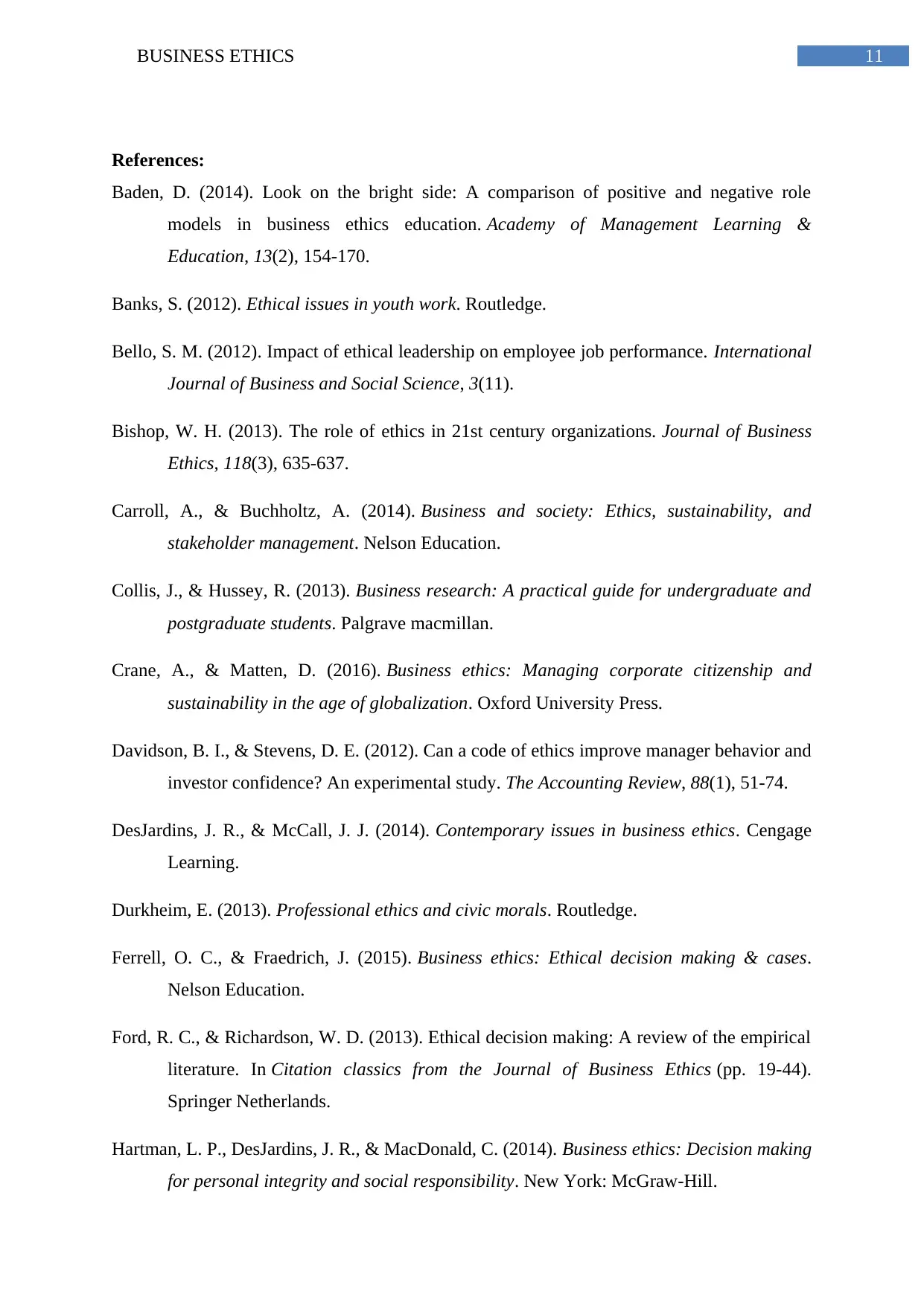
11BUSINESS ETHICS
References:
Baden, D. (2014). Look on the bright side: A comparison of positive and negative role
models in business ethics education. Academy of Management Learning &
Education, 13(2), 154-170.
Banks, S. (2012). Ethical issues in youth work. Routledge.
Bello, S. M. (2012). Impact of ethical leadership on employee job performance. International
Journal of Business and Social Science, 3(11).
Bishop, W. H. (2013). The role of ethics in 21st century organizations. Journal of Business
Ethics, 118(3), 635-637.
Carroll, A., & Buchholtz, A. (2014). Business and society: Ethics, sustainability, and
stakeholder management. Nelson Education.
Collis, J., & Hussey, R. (2013). Business research: A practical guide for undergraduate and
postgraduate students. Palgrave macmillan.
Crane, A., & Matten, D. (2016). Business ethics: Managing corporate citizenship and
sustainability in the age of globalization. Oxford University Press.
Davidson, B. I., & Stevens, D. E. (2012). Can a code of ethics improve manager behavior and
investor confidence? An experimental study. The Accounting Review, 88(1), 51-74.
DesJardins, J. R., & McCall, J. J. (2014). Contemporary issues in business ethics. Cengage
Learning.
Durkheim, E. (2013). Professional ethics and civic morals. Routledge.
Ferrell, O. C., & Fraedrich, J. (2015). Business ethics: Ethical decision making & cases.
Nelson Education.
Ford, R. C., & Richardson, W. D. (2013). Ethical decision making: A review of the empirical
literature. In Citation classics from the Journal of Business Ethics (pp. 19-44).
Springer Netherlands.
Hartman, L. P., DesJardins, J. R., & MacDonald, C. (2014). Business ethics: Decision making
for personal integrity and social responsibility. New York: McGraw-Hill.
References:
Baden, D. (2014). Look on the bright side: A comparison of positive and negative role
models in business ethics education. Academy of Management Learning &
Education, 13(2), 154-170.
Banks, S. (2012). Ethical issues in youth work. Routledge.
Bello, S. M. (2012). Impact of ethical leadership on employee job performance. International
Journal of Business and Social Science, 3(11).
Bishop, W. H. (2013). The role of ethics in 21st century organizations. Journal of Business
Ethics, 118(3), 635-637.
Carroll, A., & Buchholtz, A. (2014). Business and society: Ethics, sustainability, and
stakeholder management. Nelson Education.
Collis, J., & Hussey, R. (2013). Business research: A practical guide for undergraduate and
postgraduate students. Palgrave macmillan.
Crane, A., & Matten, D. (2016). Business ethics: Managing corporate citizenship and
sustainability in the age of globalization. Oxford University Press.
Davidson, B. I., & Stevens, D. E. (2012). Can a code of ethics improve manager behavior and
investor confidence? An experimental study. The Accounting Review, 88(1), 51-74.
DesJardins, J. R., & McCall, J. J. (2014). Contemporary issues in business ethics. Cengage
Learning.
Durkheim, E. (2013). Professional ethics and civic morals. Routledge.
Ferrell, O. C., & Fraedrich, J. (2015). Business ethics: Ethical decision making & cases.
Nelson Education.
Ford, R. C., & Richardson, W. D. (2013). Ethical decision making: A review of the empirical
literature. In Citation classics from the Journal of Business Ethics (pp. 19-44).
Springer Netherlands.
Hartman, L. P., DesJardins, J. R., & MacDonald, C. (2014). Business ethics: Decision making
for personal integrity and social responsibility. New York: McGraw-Hill.
⊘ This is a preview!⊘
Do you want full access?
Subscribe today to unlock all pages.

Trusted by 1+ million students worldwide
1 out of 13
Related Documents
Your All-in-One AI-Powered Toolkit for Academic Success.
+13062052269
info@desklib.com
Available 24*7 on WhatsApp / Email
![[object Object]](/_next/static/media/star-bottom.7253800d.svg)
Unlock your academic potential
Copyright © 2020–2026 A2Z Services. All Rights Reserved. Developed and managed by ZUCOL.





